ESCAPE
Thinking of moving to small-town South Africa? Look around before you take the leap
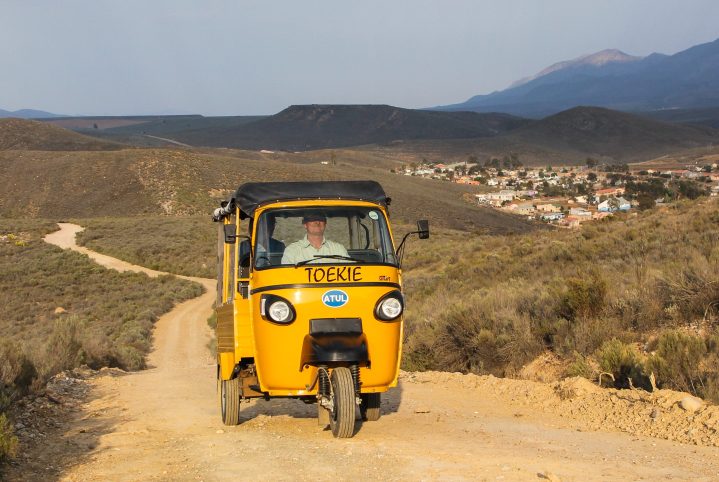
For those looking for a change of pace, doing your homework on a potential new town is essential for finding the perfect balance of affordability, safety, social capital and a healthy dose of eccentricity.
Many people have asked us why we came to live in Cradock, all the way from the Big Smoke. It’s not exactly a trendy destination. It is, however, a town that is strong on agriculture, schools, artisanal skills, a measure of tourism – and social capital.
The main reason we came to live in Cradock is the people. In 2003 we stayed at one of the beautiful Victorian-era Tuishuise, met owner and restorer Sandra Antrobus and then the rest of her family. What delightful, down-to-earth, hospitable souls, we thought. They introduced us to a bunch of kind and interesting local people when we returned the next year.
One of them was a man who played the flute, violin and ukulele, restored motorbikes and made catapults which he preferred not to sell. He was also occasionally spotted wearing a Viking helmet. This lovely man was entirely at home in Cradock, and so we knew that the little river town was open for English-speaking eccentrics like us. It also didn’t hurt that property is quite affordable, the streets are pine-scented thanks to the old trees, the community is here year-round, there are couriers, and a river runs through it.
We put down an offer on a modestly priced three-bedroomed 1930s house with a fireplace, wooden floors, sash windows and a fruit-bearing garden. We sold well in Johannesburg and used most of the profits to repair our new abode and launch a small publishing firm.
Homework, homework, homework
When Johannesburg-based radio journalist David Holt-Biddle turned 60 in 2003, he and his wife Sue started to think about swopping their home in Westdene for something a little safer and quieter. They’d almost settled on a secure townhouse complex in Randburg when friends who had moved to southern KwaZulu-Natal a year before, invited them to visit. The Holt-Biddles found their friends happy and fulfilled in their new home. It was inspiring.
“We went to see their estate agent and were shown sea-view stands still available at bargain basement prices. We loved the village and the area so we did some research, came back to the coast and bought a stand in Trafalgar, where we eventually had a log home built. We sold up in Joburg and moved down exactly a year after our first exposure to the idea. Gone were thoughts of living in a gated community in Randburg.”
It was not a decision Sue and David took lightly though. “Estate agents talk of three criteria when it comes to property: location, location, location. When it comes to moving towns, three other criteria are also essential: homework, homework, homework.”
Viewed from the outside
Watch out for towns where no one likes to drink the water: litter and bad water management are often signs of deeper damage, and that trail leads right up to the front steps of the municipal offices. If you find a town where the chamber of commerce can actually sit down with the municipality and work something out for the good of all, then you’ve hit the jackpot.
The water issue is paramount. Ask the locals how municipal water is managed, and where it comes from – river, dam or borehole. How reliable is the water during drought conditions?
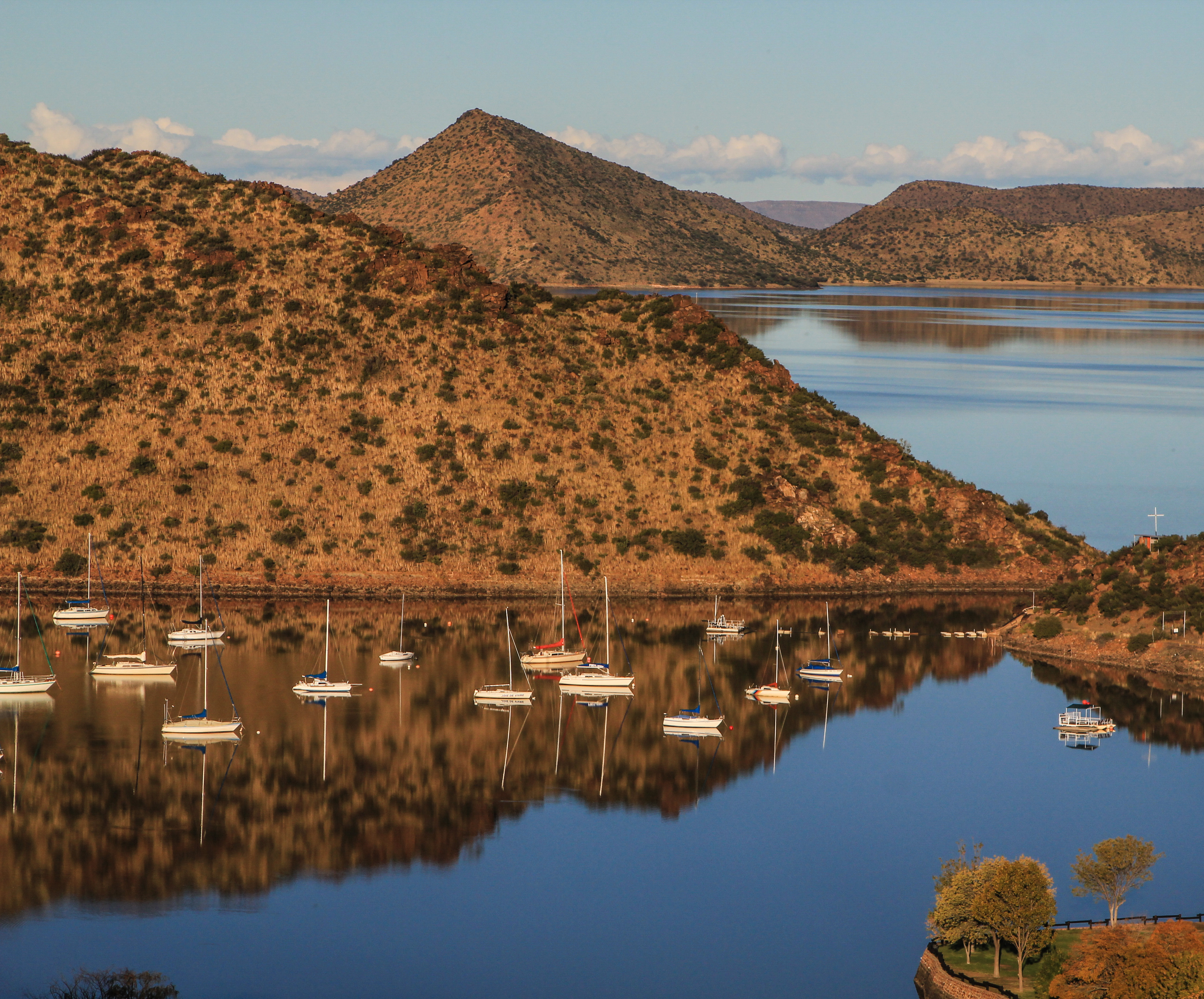
Gariep, Free State: Lakeside living on South Africa’s biggest dam. Image: Chris Marais
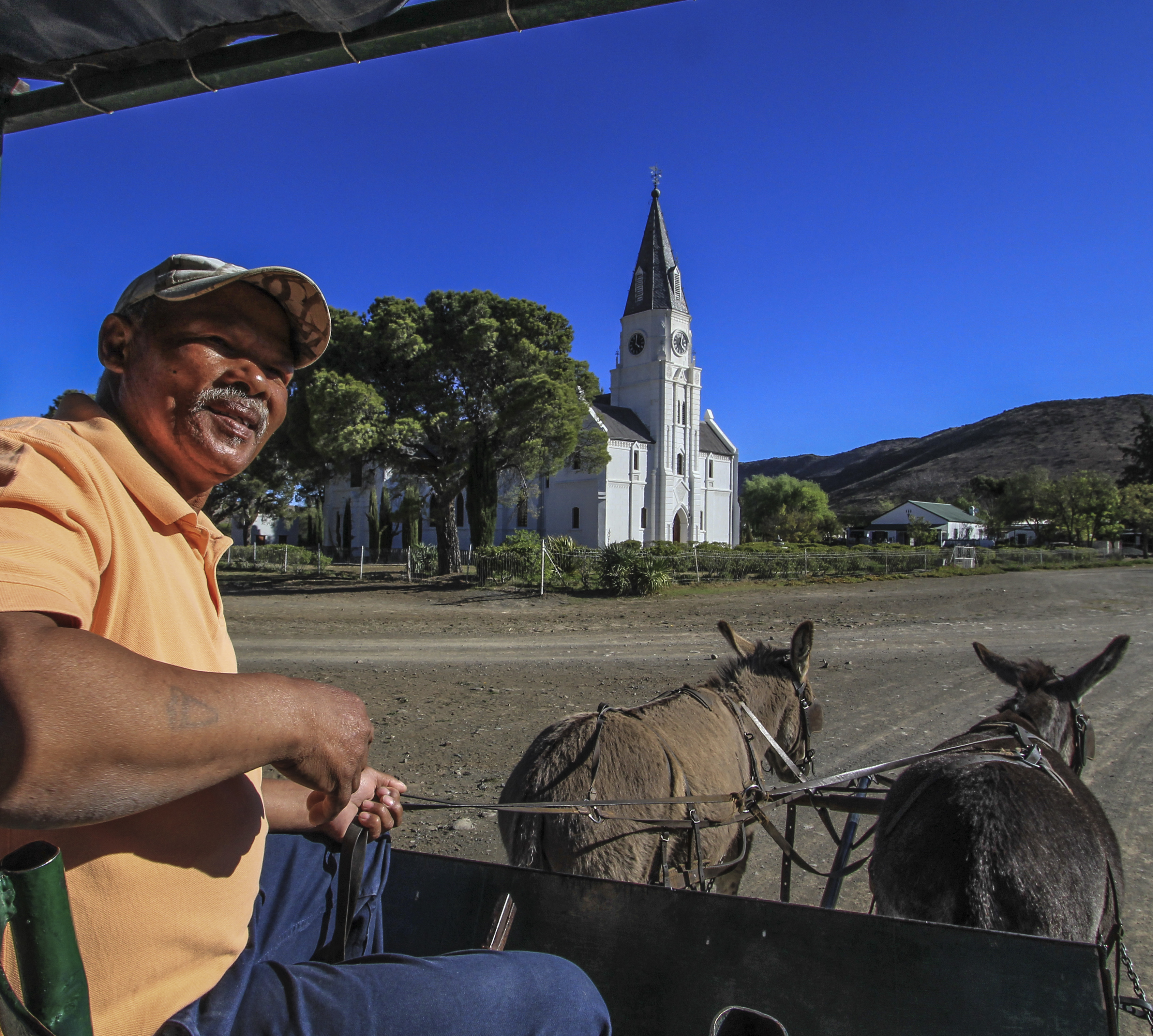
Nieu-Bethesda, Eastern Cape: The village streets are untarred because that’s the way people there like them. (Photo: Chris Marais)
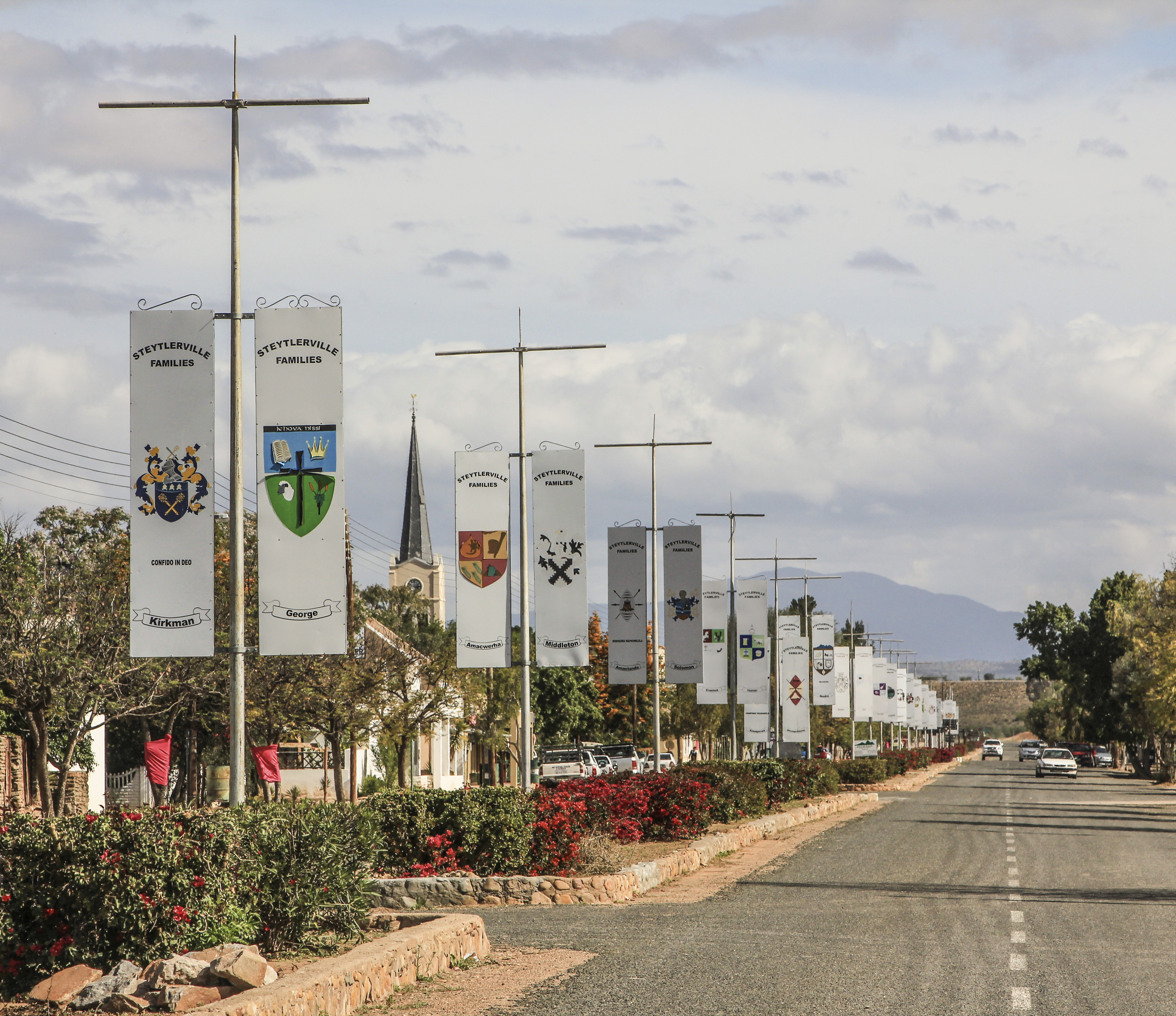
Steytlerville, Eastern Cape: a remarkable local community. Image: Chris Marais
You can also give a town points for the way it looks after its poor and its animals. If there is a feeding scheme or a homeless shelter and if residents support their SPCA, it has promise. If there are signs of bridges between the communities, you have cause to be even more positive. This is South Africa and groups tend to live past each other – but they don’t have to.
Is there strong civil society involvement, or do the locals simply not give a damn?
Check out the hospital. Any good? Or just another depressed germ factory? Now work out exactly where you would go in a medical emergency. Find out if there’s a private ambulance service running to a big city or a good hospital in another town, and if your medical aid scheme covers it. You may find that specialists visit on a weekly or monthly basis.
What is the schooling system like? There’s nothing sadder than a deserted schoolyard – and few things more pleasant than a grandstand packed with ardent supporters at a high school rugby game in the country.
Interestingly, some communities with a substantial number of incomers have set up private schools. Homeschooling is also becoming more popular.
If your business relies on internet access, check out available bandwidth and service providers. How reliable is the electricity supply?
Speak to other newcomers to see what their experience has been like. Are there good builders or renovators? Is it easy to deal with the municipality? Step lightly around a town that relies solely on extractive mining. It has a limited future, invested in a diminishing resource. Favour a settlement with diversity and more sustainable options.
Viewed from the inside
A specific house or the main street architecture might rock your boat, but it’s all about the people living there.
Make sure you have someone to talk to, to share coffee with, to pray with, to take on projects with or to share a good book, movie or song with. You cannot live in isolation, no matter how big, flat, curved or clever your TV screen is. It helps if there’s a local champion. In the rural areas, one person can indeed make a difference. That person is normally the tourism firebrand, someone with a passion for restoring the local heritage, someone whose blood boils at the sight of litter all over the place.
Favour a town that tells its own story well. It’s normally a place with a lot of festivals, tour guides and raconteurs. Are the local cops any good? How’s the vet? Will there be a reasonable old age home for your sunset days? Are there too many golf courses sucking up too much water?
Resort towns can be charming to visit, but less so to inhabit. They are packed to capacity during holiday times, but many are hollowed out and lonely for the rest of the year.
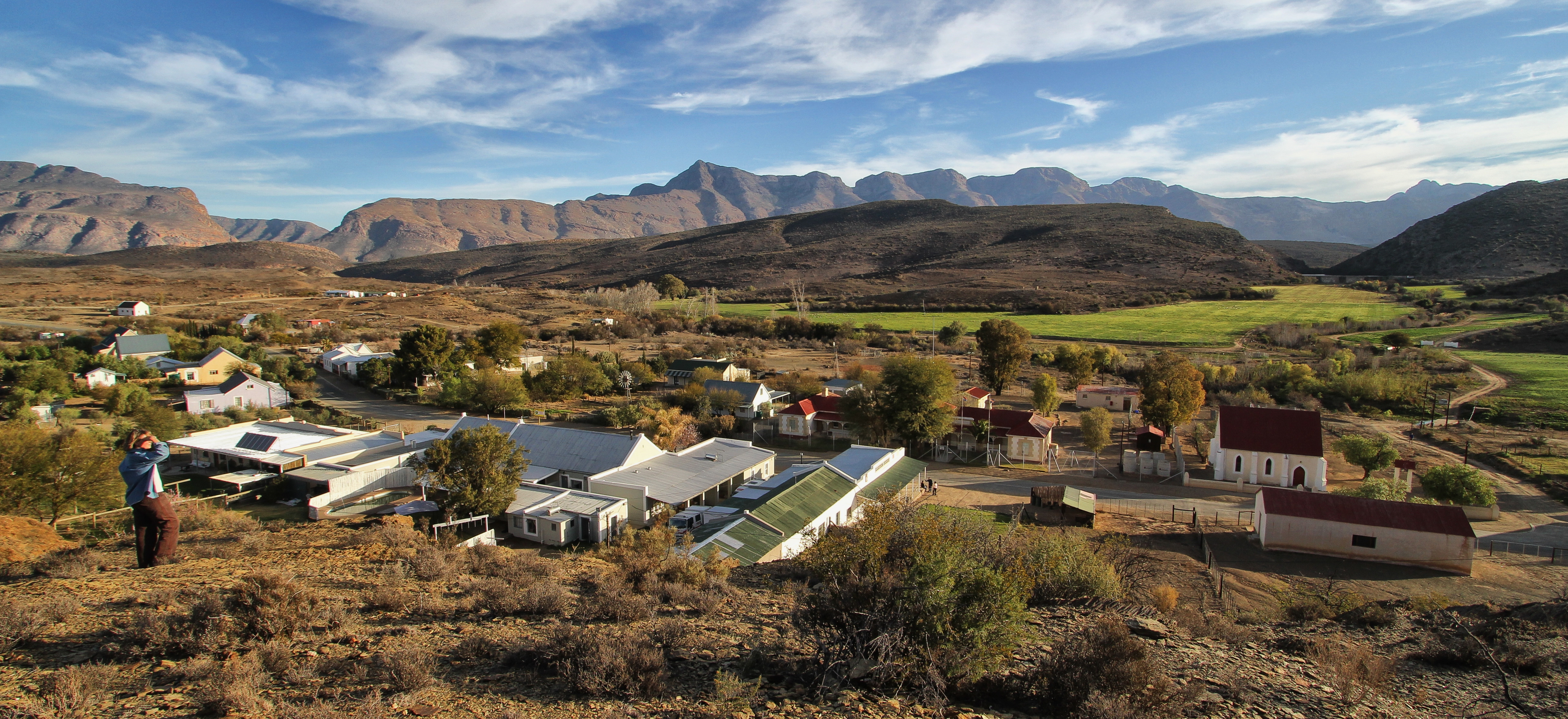
Klaarstroom, the tiny Western Cape Karoo village with the huge view. (Photo: Chris Marais)
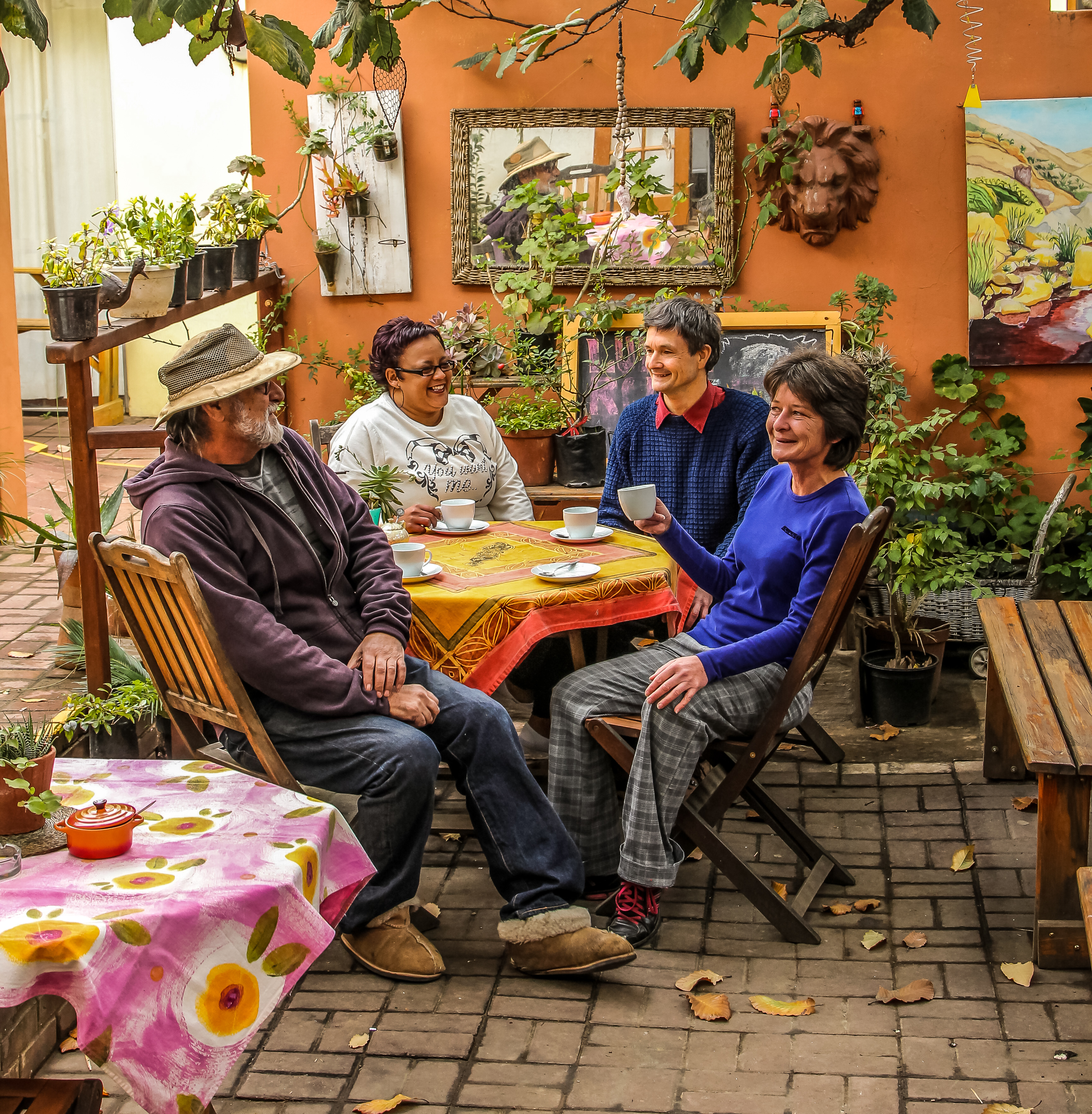
Barrydale, Western Cape: Coffee with mates at midday – priceless time spent. (Photo: Chris Marais)
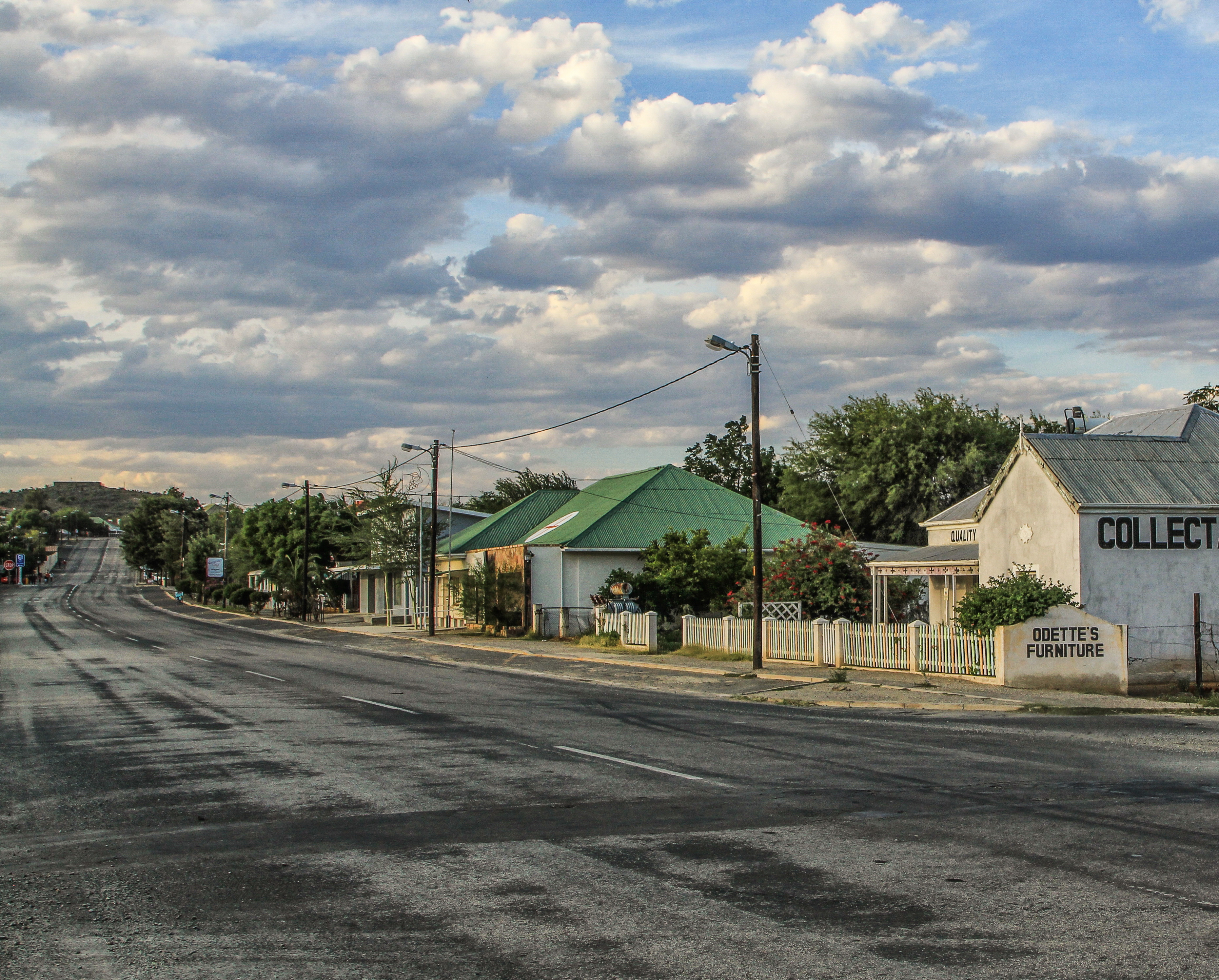
Jansenville, Eastern Cape: Rush hour in Mohair Country. (Photo: Chris Marais)
Practical considerations
A truly startling number of people make the move from a city to the platteland on a wing and a prayer, the sign of a rainbow in the sky or an owl in a tree. They leap in feet-first without doing too much investigation and, even more surprisingly, a number of them manage to find their happy place.
It is also true that fondness for the town and its people weighs hugely in its favour. And the road trips to reconnoitre your new home are vivid adventures you’ll never forget.
If you are the more methodical type, there are a few things to look out for before you sign an offer to purchase. Obviously, the local facilities and infrastructure must suit the kind of life you have in mind.
Sometime in 1972, former diplomat, travel writer and publisher Richard Proctor-Sims was driving down from Johannesburg to Cape Town in his 1100 Fiat D. Somewhere near Beaufort West, he left the N1, crossed a few farm roads and climbed out of the car.
“I suppose that’s how most people get hooked on the Karoo. I stopped, I smelled the air and I listened. I heard silence for the first time. And then I swore to myself: this is where I’ll spend my last days.”
In later years, Richard and his wife Viola headed off on a series of three-week journeys from Johannesburg into the Karoo, staying in small towns and giving them their own private star rating. Their rating system was based on “location (preferably not on but not too far from a national road), quality of access roads, amenities, size, business activity, history, age, weather, architecture, guesthouse accommodation, warmth of likely future neighbours and general ambience.”
Philippolis received the highest number of “stars” from Richard and Viola.
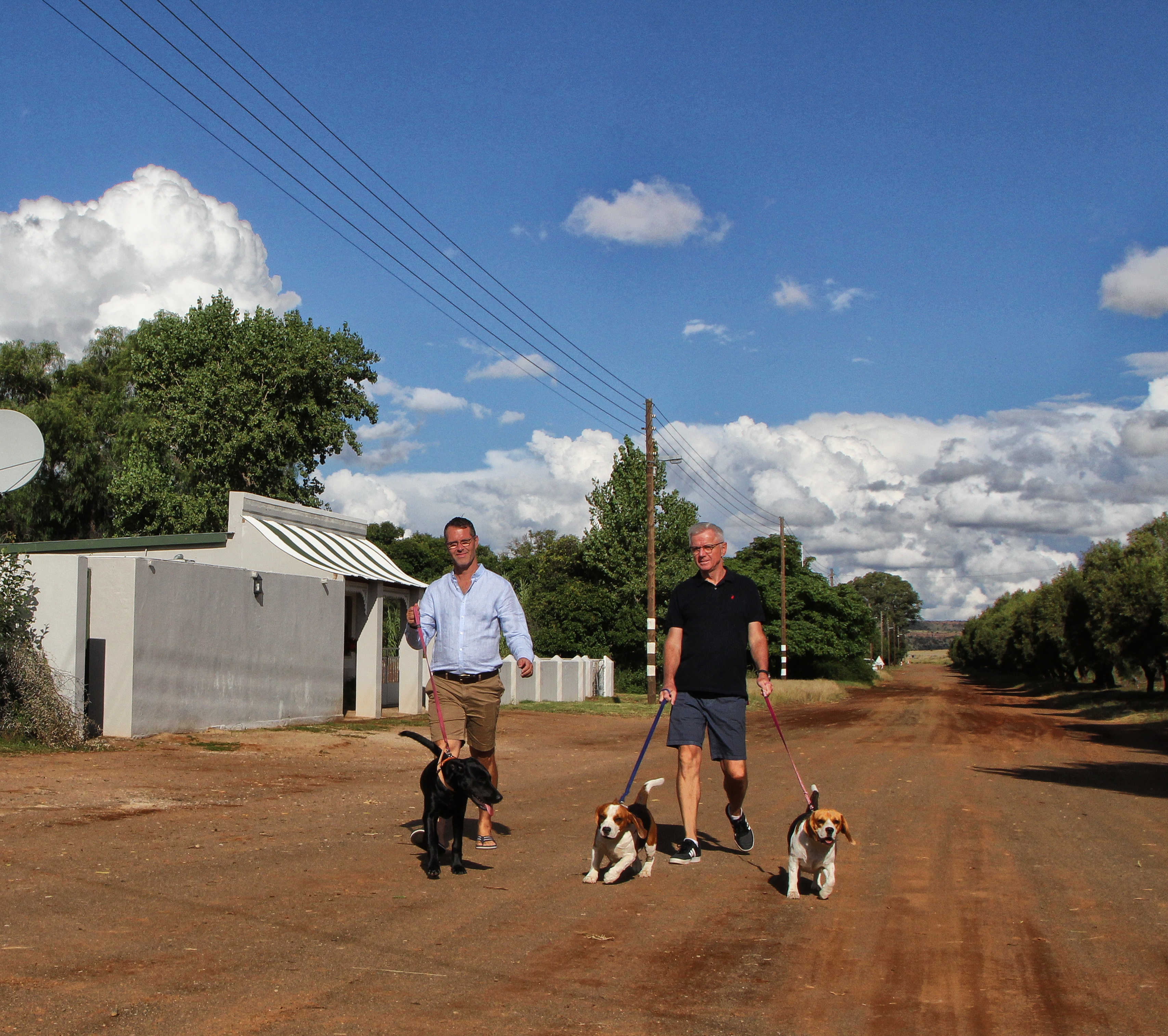
Philippolis, Free State: Never underestimate the value of being able to walk your dogs on a dirt road under open skies. (Photo: Chris Marais)
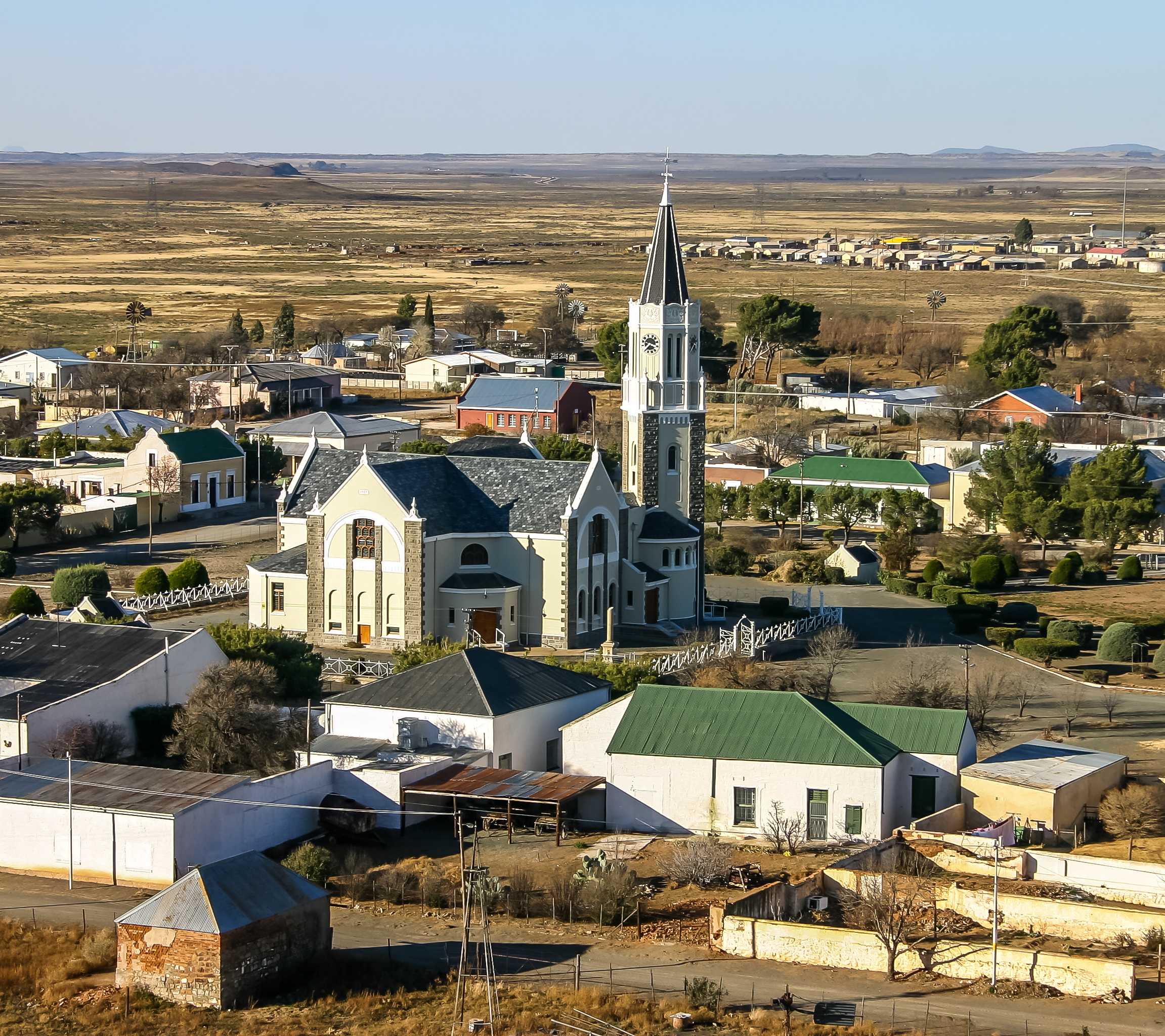
Hanover, Northern Cape: From Trappieskoppie you can see the Karoo forever. Image: Chris Marais
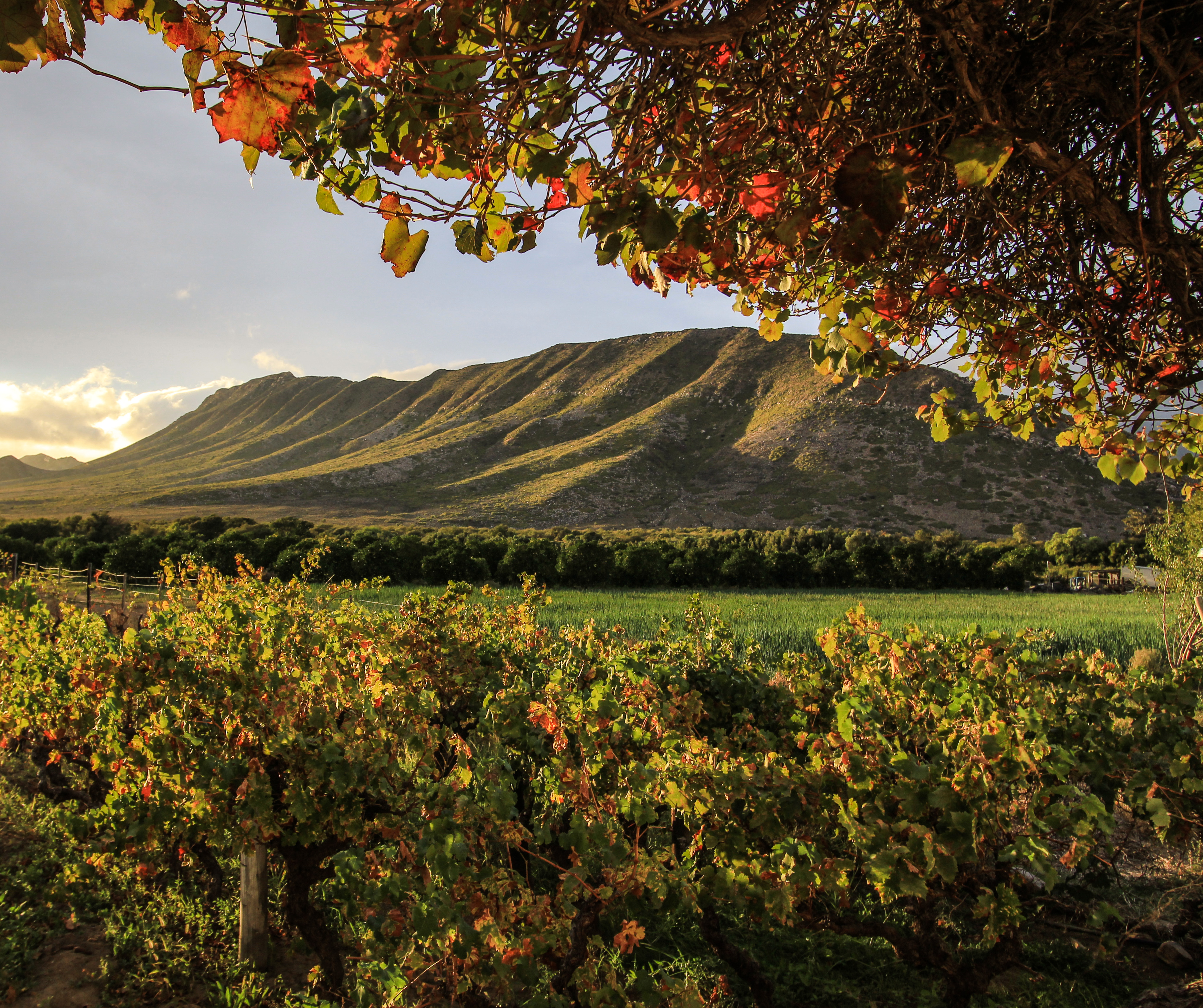
Prince Albert, Western Cape: Imagine waking up to this glorious sight every morning. (Photo: Chris Marais)
Be a realist not a romantic
As a general rule, coming to a village for a weekend with your packets of oven-ready bakes and heirloom tomatoes from Woolworths does not give you a true idea of what local life is like.
Katrin Allemann of Nieu-Bethesda agrees:
“Before you move, you should first stay there at various times of the year. Maybe rent a place and live there for a while so that if you do decide to move, you start as a realist and not a romantic.” DM
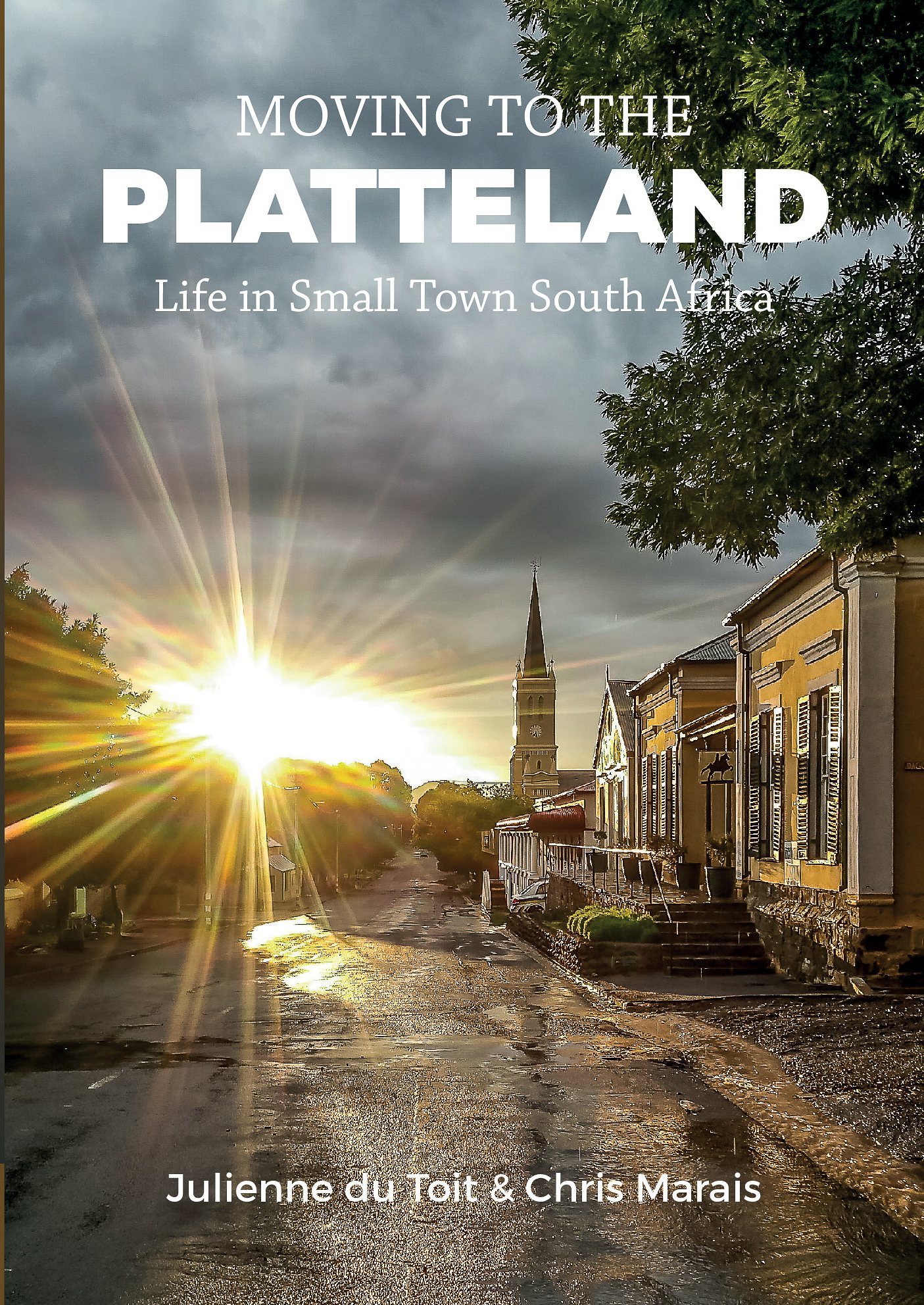
‘Moving to the Platteland: Life in Small Town South Africa’ by Chris Marais and Julienne du Toit.
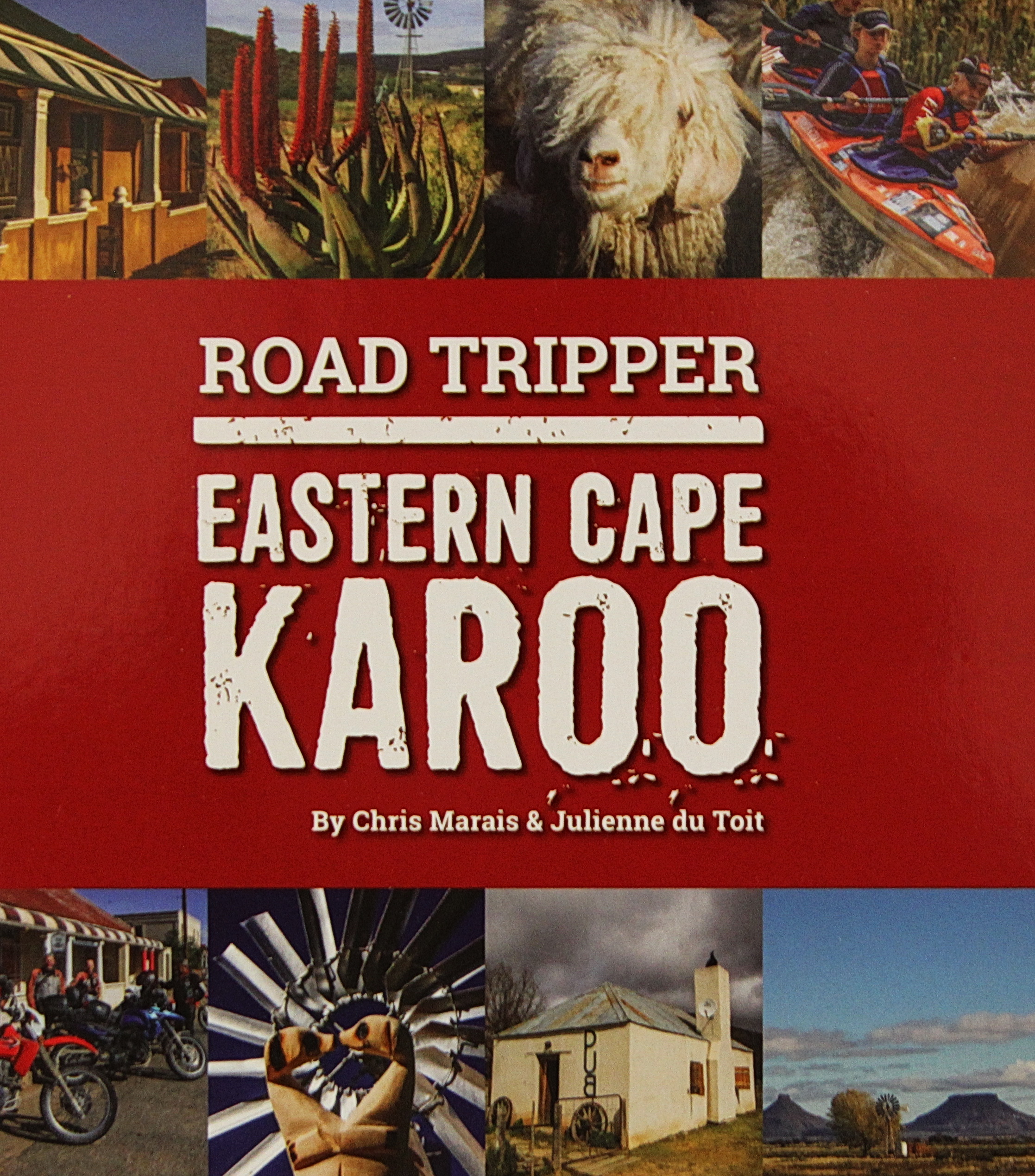
‘Road Tripper: Eastern Cape Karoo’ by Chris Marais and Julienne du Toit.
This is an excerpt from Road Tripper: Eastern Cape Karoo by Chris Marais and Julienne du Toit. The authors are offering a two-book special of Moving to the Platteland: Life in Small Town South Africa and Road Tripper: Eastern Cape Karoo for only R520, including courier costs in South Africa. For enquiries, contact [email protected].



















Loved this, thank you! I too hope to find my spot in the Karoo to live out my last day as did Richard.
Great article, thank you.
This article evokes tranquillity and juxtaposes the amount of work involved in making a such a life-changing decision.
DM, would be a great idea as a monthly feature, yes? Local flavour of a small enclave. I’d enjoy that.
I second this.
Me too.
@Anne Swart. Yes. Great idea. Kind of like that Getaway magazine. How does, “The Maverick Vagabond” sound?
Send the application forms please. First dibs.
Your Karoo articles are always such a pleasure to read, so please keep writing! This is such good advice. People often think that moving to the country will be enchanting and friendly; back in the day I was once called on to resolved a dispute in a Cape village that had disintegrated into WWIII! I’d even thought of buying a plot there until that experience 🙂 So yes, do your homework …it’s the people and infrastructure that matters. But I can’t leave the sea so I rely on you to tell us how wonderful the binneland is.
This article makes a lot of sense and reminds me of our decision making process some 45 years ago.
However, there is one thing in “considerations” that I missed and that is your family. Will your children be able to visit you? Will you be able to visit them, particularly on special occasions, which are mainly related to the grandchildrens’ birthdays, sports occasions, etc. Will they be able to be with you in times of illness, and similarly can you be there for them when needed, etc.
Another consideration that has now become more pertinent in SA, is to what degree can you become more self sufficient. We have our own water supply and have never been without even during the most severe droughts. We grow as many veggies etc as we can and now get by without a regular supply from Escom, but this did require dipping into our retirement funds to go solar. Fortunately we have a very effective neighbourhood watch organisation, which does make us feel more secure.
We moved from the Witwatersrand to Magoebaskloof in Limpopo more than 40 years ago and believe that it was the best decision we ever made
Lots of good advice here. I speak from experience.
Such good advice. Perhaps add to ‘considerations’ how many people (if any) were forcibly removed to make it possible for this to be your perfect spot/village – and what is being done to make reparations for that damage?
Really loved our stay in the Mountain Zebra Park outside of Cradock but but Cradock was the most litter strewn town I’ve ever driven through.
And water in that area is huge disaster
Totally agree. If litter, or rather lack of litter, was a criteria for selecting a small town, Cradock would be last on my list.
Good advice for the grass is seldom greener..
“Watch out for towns where no one likes to drink the water: litter and bad water management are often signs of deeper damage, and that trail leads right up to the front steps of the municipal offices.” These towns are usually outside the Western Cape, they account for most small municipalities, and have something else in common. A pernicious diseases, perhaps. Like a cANCer.
In total contrast to Karoo towns, Pringle Bay on the tip of False Bay opposite to Cape Point is a seaside village in the Kogelberg Biosphere Reserve, a UNESCO Heritage Site. It’s as close to paradise as you’ll get, though the wind takes some getting used! Folks are flocking from Gauteng and building is booming. Unfortunately, the existing infrastructure isn’t coping too well – dirt roads washed away and potholed, water pipes constantly popping, and electricity … well that’s Eskom and not the muni! We don’t have water-borne sewerage, so newbies are constantly complaining about how long it takes the “honeysucker” to get to them. Many can’t get used to our furry baboon inhabitants and other wildlife. But that’s another story. Didn’t anybody tell them they were moving to a biosphere reserve? In fact a lot of them complain about everything! I’m guessing they didn’t do their homework! We discovered Pringle Paradise more than four decades ago and have lived here for more than eight years full-time. It’s the best.
Great article, thank you.
Try Darling in the Western Cape. Close enough to the city, but far enough to relax Wonderful dorpie with lots to do. Only 30 minutes from the seaside, but without the fog and rust. So glad we moved here 6 years ago.
A very interesting article from a couple we all respect, and know, are talented writers and observers. We relate to all of this and understand there is justifiably much focus on the Karoo – however, do look at other areas too, and here we include people places and properties. We love the Cape countryside, but look beyond that, and we are not necessarily looking, for a variety of reasons (medical in my case being one), to relocate and live in the places we visit. We do however have glorious ‘short breaks’ often returning, and all of this is not just for groups of friends and family, but couples (and singles) too. Wonderful hosts at guest farms, guest houses, B&B’s, hotels and all else, and of course self-catering. Familiarise yourself with the wonderful owner/managed properties (and yes,
they’ll sort out supper on a Sunday night, when all else might be closed and you don’t feel like cooking). Always happy to recommend, and I have no specific link to any property or place, we are completely independent. Happy travelling!
Stilbaai for us 🙂
Very inspiring story.
Mine is a request from the editors of this newspaper to try and add invite articles that embrace and appeal to a diverse audience on such interesting topics. Antonnette Rowlands raised a pertinent comment in this very paper last year that the moves and the lives described are targeted at a white audience and I am in full agreement! Having been a global citizen for more than a decade I decided to come home and like most yearn to for that serene lifestyle. Being a black South African am obviously aware that the experiences will vary. It would be nice if a piece that takes cognisance of the challenges that may be faced by the black middle class would be featured in such moves. in other words a little of the other perspectives as in the limited travel I have done here since coming back I do sometimes feel some discomfort in my own country.
Hoo boy, there’s always one
Percival Gibbon, a Welshman, and like Kipling, who was one of Britain’s great authors and poets of stature similar to Shakespeare and Dickens, came to SA in 1899 as a Boer war correspondent. Gibbon wrote for the Rand Daily Mail and a number of English papers. He stayed for quite a few years and wrote short stories, one ‘Vrouw Grobelaar’s Leading Case’ s in 1905. The style of which it is said, Herman Charles Bosman followed. Both fell deeply in love with the Karoo and returned to it time and time again (Kipling 10 times !!). PG wrote:
THE GREAT KAROO
Years and years I’ve ‘trekked’ across it
Ridden back and fore
Till the silence and the glamour,
Ruled me to the core.
No man ever knew it better
None could love it more.
So what it is about a region that is dusty, heavingly hot in summer and bittely cold in winter, stretched for resources, vastly remote, that appeals to people like us and especially to some of those from completely foreign and unfamiliar lands.
Go there and you will soon see. There is nothing else like it on earth. What a trreasure we have.
Notice too , how the work ‘trek(ked)’ was starting to be assimilated into the English language – even in the early 1900s. This is what the Karoo does.
Also read Lawrence Green’s book called simply ‘Karoo’ written about 1950. Stories, anecdotes abound.
I simply have to share this poem I wrote for what it’s worth , inspired by these articles by Chris Marais and a bit of John Denver:
Flat topped koppies, capped with krantzes,
Swartberg mountains, winding, twisting passes.
Like is quiet there, quiter than the breeze,
Older than the dongas winding past the trees.
Deep blue skies take be back to the farm that is mine
In the distant Great Karoo.
Let me lie under the sky.
Karoo horizons set my tone
Sustain me ever as I wander all alone.
It’s bright and sunny under puffy clouds,
Eternal hope of rain with it’s thunder loud.
Deep blue skies take be back to the farm that is home
In the distant Great Karoo.
There forever may I roam.
Mirages in the summer heat shimmer on the distant plains.
Thorn trees long for summer rains.
The bleating sheep as the herd passes by,
with dusty clouds soaring high, soaring high.
Deep blue skies return me please to the farm that is mine
In the distant Great Karoo.
Let me lie until my time.